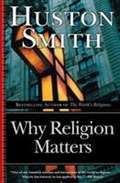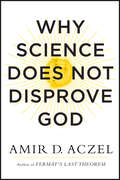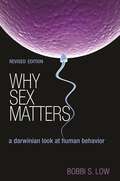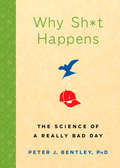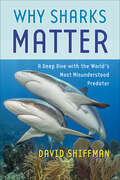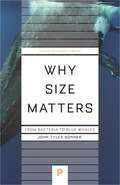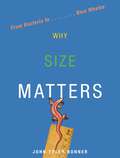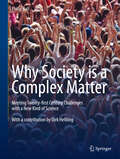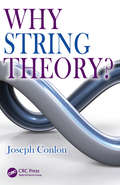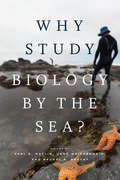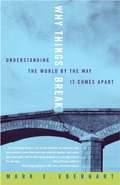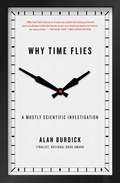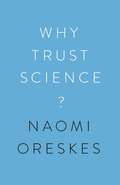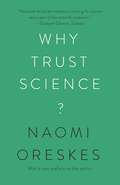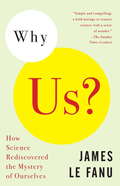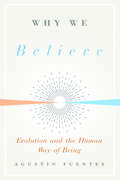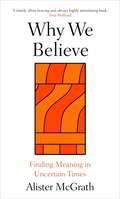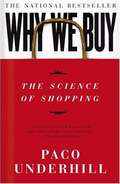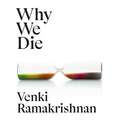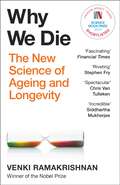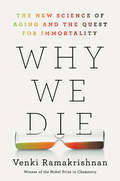- Table View
- List View
Why Religion Matters: The Fate of the Human Spirit in an Age of Disbelief
by Huston SmithHuston Smith, the author of the classic bestseller The World's Religions, delivers a passionate, timely message: The human spirit is being suffocated by the dominant materialistic worldview of our times. Smith champions a society in which religion is once again treasured and authentically practiced as the vital source of human wisdom.
Why Science Does Not Disprove God
by Amir D. AczelThe bestselling author “wields impressive intellectual weapons in demolishing the New Atheists’ claims that science has disproven the existence of God” (Booklist, starred review).The renowned science writer, mathematician, and bestselling author of Fermat’s Last Theorem masterfully refutes the overreaching claims of the “New Atheists,” providing millions of educated believers with a clear, engaging explanation of what science really says, how there’s still much space for the Divine in the universe, and why faith in both God and empirical science are not mutually exclusive.A highly publicized coterie of scientists and thinkers, including Richard Dawkins, the late Christopher Hitchens, and Lawrence Krauss, have vehemently contended that breakthroughs in modern science have disproven the existence of God, asserting that we must accept that the creation of the universe came out of nothing, that religion is evil, that evolution fully explains the dazzling complexity of life, and more. In this much-needed book, science journalist Amir Aczel profoundly disagrees and conclusively demonstrates that science has not, as yet, provided any definitive proof refuting the existence of God.Why Science Does Not Disprove God is his brilliant and incisive analyses of the theories and findings of such titans as Albert Einstein, Roger Penrose, Alan Guth, and Charles Darwin, all of whose major breakthroughs leave open the possibility—and even the strong likelihood—of a Creator. Bolstering his argument, Aczel lucidly discourses on arcane aspects of physics to reveal how quantum theory, the anthropic principle, the fine-tuned dance of protons and quarks, the existence of anti-matter and the theory of parallel universes, also fail to disprove God.“[An] intelligent and stimulating book.” —The Washington Post
Why Sex Matters: A Darwinian Look at Human Behavior - Revised Edition
by Bobbi S. LowWhy are men, like other primate males, usually the aggressors and risk takers? Why do women typically have fewer sexual partners? In Why Sex Matters, Bobbi Low ranges from ancient Rome to modern America, from the Amazon to the Arctic, and from single-celled organisms to international politics, to show that these and many other questions about human behavior largely come down to evolution and sex. More precisely, as she shows in this uniquely comprehensive and accessible survey of behavioral and evolutionary ecology, they come down to the basic principle that all organisms evolved to maximize their reproductive success and seek resources to do so, but that sometimes cooperation and collaboration are the most effective ways to succeed.This newly revised edition has been thoroughly updated to include the latest research and reflect exciting changes in the field, including how our evolutionary past continues to affect our ecological present.
Why Sh*t Happens: The Science of a Really Bad Day
by Peter J. BentleyHave you ever fallen victim to Murphy's law? Sometimes bad things just happen. In Why Sh*t Happens, esteemed British scientist Peter J. Bentley takes readers on an informative and amusing tour through the least lucky, most accident-prone day of their lives. From sleeping through the alarm clock and burning breakfast to getting caught in the rain and navigating a slippery road, Bentley brilliantly explores disaster and mishap on a molecular level. In the process, he explains the science behind each accident, arming readers with the knowledge to understand what went wrong and how they can steer clear of future harm.Science is respected, trusted, and according to Bentley, largely misunderstood. Why Sh*t Happens urges readers to arm themselves with the power of science in order to better understand the world around them. When a car engine is damaged by the wrong gasoline or a computer is attacked by a virus, science is not to blame, but rather can provide an explanation of what happened.In a text that exudes charm and wit, Bentley reveals the causes behind a wide spectrum of mishaps, including why that razor nick won't stop bleeding, why metal sparks in the microwave, what makes chewing gum stick in hair, and why milk tastes sour when it goes bad.Sh*t will always happen, but now readers will know exactly why. Enter, if you dare, the world of everyday disasters.
Why Sharks Matter: A Deep Dive with the World's Most Misunderstood Predator
by David ShiffmanGet submerged in the amazing world of sharks! Your expert host, award-winning marine biologist Dr. David Shiffman, will show you how—and why—we should protect these mysterious, misunderstood guardians of the ocean.Sharks are some of the most fascinating, most ecologically important, most threatened, and most misunderstood animals on Earth. More often feared than revered, their role as predators of the deep have earned them a reputation as a major threat to humans. But the truth is that sharks are not a danger to us—they're in danger from us.In Why Sharks Matter, marine conservation biologist Dr. David Shiffman explains why it's crucial that we overcome our misconceptions and rise above cinematic jump scares to embrace sharks as the imperiled and elegant ocean guardians they really are. Sharing his own fascinating experiences working with sharks, Shiffman tells us• why healthy shark populations are a must for supporting ocean ecosystems—and the coastal economies that depend on them • why we're in danger of losing many shark species forever• what scientists, conservationists, and readers can do to help save these iconic predators• why so much of what you've heard about sharks and how to save them is wrong Exploring the core tenets of shark conservation science and policy, Shiffman synthesizes decades of scientific research and policymaking, weaving it into a narrative full of humor and adventure. Touching on everything from Shark Week to shark fin soup, overfishing to marine sanctuaries, Shiffman reveals why sharks are in trouble, why we should care, and how we can save them. Perfect for shark enthusiasts, Why Sharks Matter is an approachable, informative guide to the world of shark conservation and the passionate, fascinating, brilliant people who work to understand and protect our oceans. This fun read will have you looking at sharks with a fresh perspective and an understanding that the survival of sharks is crucial to the survival of another apex predator—ourselves.
Why Size Matters: From Bacteria to Blue Whales (Princeton Science Library #142)
by John Tyler BonnerJohn Tyler Bonner, one of our most distinguished and creative biologists, here offers a completely new perspective on the role of size in biology. In his hallmark friendly style, he explores the universal impact of being the right size. By examining stories ranging from Alice in Wonderland to Gulliver's Travels, he shows that humans have always been fascinated by things big and small. Why then does size always reside on the fringes of science and never on the center stage? Why do biologists and others ponder size only when studying something else—running speed, life span, or metabolism?Why Size Matters, a pioneering book of big ideas in a compact size, gives size its due by presenting a profound yet lucid overview of what we know about its role in the living world. Bonner argues that size really does matter—that it is the supreme and universal determinant of what any organism can be and do. For example, because tiny creatures are subject primarily to forces of cohesion and larger beasts to gravity, a fly can easily walk up a wall, something we humans cannot even begin to imagine doing.Bonner introduces us to size through the giants and dwarfs of human, animal, and plant history and then explores questions including the physics of size as it affects biology, the evolution of size over geological time, and the role of size in the function and longevity of living things.As this elegantly written book shows, size affects life in its every aspect. It is a universal frame from which nothing escapes.
Why Size Matters: From Bacteria to Blue Whales (Princeton Science Library #142)
by John Tyler BonnerWhy size plays such a big role in the living worldJohn Tyler Bonner, one of our most distinguished and creative biologists, here offers a completely new perspective on the role of size in biology. In his hallmark friendly style, he explores the universal impact of being the right size. By examining stories ranging from Alice in Wonderland to Gulliver's Travels, he shows that humans have always been fascinated by things big and small. Why then does size always reside on the fringes of science and never on the center stage? Why do biologists and others ponder size only when studying something else--running speed, life span, or metabolism?Why Size Matters, a pioneering book of big ideas in a compact size, gives size its due by presenting a profound yet lucid overview of what we know about its role in the living world. Bonner argues that size really does matter--that it is the supreme and universal determinant of what any organism can be and do. For example, because tiny creatures are subject primarily to forces of cohesion and larger beasts to gravity, a fly can easily walk up a wall, something we humans cannot even begin to imagine doing.Bonner introduces us to size through the giants and dwarfs of human, animal, and plant history and then explores questions including the physics of size as it affects biology, the evolution of size over geological time, and the role of size in the function and longevity of living things.As this elegantly written book shows, size affects life in its every aspect. It is a universal frame from which nothing escapes.
Why Society is a Complex Matter
by Philip BallSociety is complicated. But this book argues that this does not place it beyond the reach of a science that can help to explain and perhaps even to predict social behaviour. As a system made up of many interacting agents - people, groups, institutions and governments, as well as physical and technological structures such as roads and computer networks - society can be regarded as a complex system. In recent years, scientists have made great progress in understanding how such complex systems operate, ranging from animal populations to earthquakes and weather. These systems show behaviours that cannot be predicted or intuited by focusing on the individual components, but which emerge spontaneously as a consequence of their interactions: they are said to be 'self-organized'. Attempts to direct or manage such emergent properties generally reveal that 'top-down' approaches, which try to dictate a particular outcome, are ineffectual, and that what is needed instead is a 'bottom-up' approach that aims to guide self-organization towards desirable states. This book shows how some of these ideas from the science of complexity can be applied to the study and management of social phenomena, including traffic flow, economic markets, opinion formation and the growth and structure of cities. Building on these successes, the book argues that the complex-systems view of the social sciences has now matured sufficiently for it to be possible, desirable and perhaps essential to attempt a grander objective: to integrate these efforts into a unified scheme for studying, understanding and ultimately predicting what happens in the world we have made. Such a scheme would require the mobilization and collaboration of many different research communities, and would allow society and its interactions with the physical environment to be explored through realistic models and large-scale data collection and analysis. It should enable us to find new and effective solutions to major global problems such as conflict, disease, financial instability, environmental despoliation and poverty, while avoiding unintended policy consequences. It could give us the foresight to anticipate and ameliorate crises, and to begin tackling some of the most intractable problems of the twenty-first century.
Why String Theory?
by Joseph ConlonPhysics World's 'Book of the Year' for 2016 An Entertaining and Enlightening Guide to the Who, What, and Why of String Theory, now also available in an updated reflowable electronic format compatible with mobile devices and e-readers. During the last 50 years, numerous physicists have tried to unravel the secrets of string theory. Yet why do these scientists work on a theory lacking experimental confirmation? Why String Theory? provides the answer, offering a highly readable and accessible panorama of the who, what, and why of this large aspect of modern theoretical physics. The author, a theoretical physics professor at the University of Oxford and a leading string theorist, explains what string theory is and where it originated. He describes how string theory fits into physics and why so many physicists and mathematicians find it appealing when working on topics from M-theory to monsters and from cosmology to superconductors.
Why Study Biology by the Sea? (Convening Science: Discovery at the Marine Biological Laboratory)
by Jane Maienschein Rachel A. Ankeny Karl S. MatlinFor almost a century and a half, biologists have gone to the seashore to study life. The oceans contain rich biodiversity, and organisms at the intersection of sea and shore provide a plentiful sampling for research into a variety of questions at the laboratory bench: How does life develop and how does it function? How are organisms that look different related, and what role does the environment play? From the Stazione Zoologica in Naples to the Marine Biological Laboratory in Woods Hole, the Amoy Station in China, or the Misaki Station in Japan, students and researchers at seaside research stations have long visited the ocean to investigate life at all stages of development and to convene discussions of biological discoveries. Exploring the history and current reasons for study by the sea, this book examines key people, institutions, research projects, organisms selected for study, and competing theories and interpretations of discoveries, and it considers different ways of understanding research, such as through research repertoires. A celebration of coastal marine research, Why Study Biology by the Sea? reveals why scientists have moved from the beach to the lab bench and back.
Why Study Biology by the Sea? (Convening Science: Discovery at the Marine Biological Laboratory)
by Jane Maienschein Rachel A. Ankeny Karl S. MatlinFor almost a century and a half, biologists have gone to the seashore to study life. The oceans contain rich biodiversity, and organisms at the intersection of sea and shore provide a plentiful sampling for research into a variety of questions at the laboratory bench: How does life develop and how does it function? How are organisms that look different related, and what role does the environment play? From the Stazione Zoologica in Naples to the Marine Biological Laboratory in Woods Hole, the Amoy Station in China, or the Misaki Station in Japan, students and researchers at seaside research stations have long visited the ocean to investigate life at all stages of development and to convene discussions of biological discoveries. Exploring the history and current reasons for study by the sea, this book examines key people, institutions, research projects, organisms selected for study, and competing theories and interpretations of discoveries, and it considers different ways of understanding research, such as through research repertoires. A celebration of coastal marine research, Why Study Biology by the Sea? reveals why scientists have moved from the beach to the lab bench and back.
Why Study Biology by the Sea? (Convening Science: Discovery at the Marine Biological Laboratory)
by Jane Maienschein Rachel A. Ankeny Karl S. MatlinFor almost a century and a half, biologists have gone to the seashore to study life. The oceans contain rich biodiversity, and organisms at the intersection of sea and shore provide a plentiful sampling for research into a variety of questions at the laboratory bench: How does life develop and how does it function? How are organisms that look different related, and what role does the environment play? From the Stazione Zoologica in Naples to the Marine Biological Laboratory in Woods Hole, the Amoy Station in China, or the Misaki Station in Japan, students and researchers at seaside research stations have long visited the ocean to investigate life at all stages of development and to convene discussions of biological discoveries. Exploring the history and current reasons for study by the sea, this book examines key people, institutions, research projects, organisms selected for study, and competing theories and interpretations of discoveries, and it considers different ways of understanding research, such as through research repertoires. A celebration of coastal marine research, Why Study Biology by the Sea? reveals why scientists have moved from the beach to the lab bench and back.
Why Things Break: Understanding the World By the Way It Comes Apart
by Mark E. EberhartDid you know— • It took more than an iceberg to sink the Titanic. • The Challenger disaster was predicted. • Unbreakable glass dinnerware had its origin in railroad lanterns. • A football team cannot lose momentum. • Mercury thermometers are prohibited on airplanes for a crucial reason. • Kryptonite bicycle locks are easily broken. “Things fall apart” is more than a poetic insight—it is a fundamental property of the physical world. Why Things Break explores the fascinating question of what holds things together (for a while), what breaks them apart, and why the answers have a direct bearing on our everyday lives. When Mark Eberhart was growing up in the 1960s, he learned that splitting an atom leads to a terrible explosion—which prompted him to worry that when he cut into a stick of butter, he would inadvertently unleash a nuclear cataclysm. Years later, as a chemistry professor, he remembered this childhood fear when he began to ponder the fact that we know more about how to split an atom than we do about how a pane of glass breaks. InWhy Things Break, Eberhart leads us on a remarkable and entertaining exploration of all the cracks, clefts, fissures, and faults examined in the field of materials science and the many astonishing discoveries that have been made about everything from the explosion of the space shuttle Challenger to the crashing of your hard drive. Understanding why things break is crucial to modern life on every level, from personal safety to macroeconomics, but as Eberhart reveals here, it is also an area of cutting-edge science that is as provocative as it is illuminating.
Why Time Flies: A Mostly Scientific Investigation
by Alan Burdick“Erudite and informative, a joy with many small treasures.” —Science “Time” is the most commonly used noun in the English language; it’s always on our minds and it advances through every living moment. But what is time, exactly? Do children experience it the same way adults do? Why does it seem to slow down when we’re bored and speed by as we get older? How and why does time fly?In this witty and meditative exploration, award-winning author and New Yorker staff writer Alan Burdick takes readers on a personal quest to understand how time gets in us and why we perceive it the way we do. In the company of scientists, he visits the most accurate clock in the world (which exists only on paper); discovers that “now” actually happened a split-second ago; finds a twenty-fifth hour in the day; lives in the Arctic to lose all sense of time; and, for one fleeting moment in a neuroscientist’s lab, even makes time go backward. Why Time Flies is an instant classic, a vivid and intimate examination of the clocks that tick inside us all.
Why Trust Science?
by Naomi OreskesWhy the social character of scientific knowledge makes it trustworthyDo doctors really know what they are talking about when they tell us vaccines are safe? Should we take climate experts at their word when they warn us about the perils of global warming? Why should we trust science when our own politicians don't? In this landmark book, Naomi Oreskes offers a bold and compelling defense of science, revealing why the social character of scientific knowledge is its greatest strength—and the greatest reason we can trust it.Tracing the history and philosophy of science from the late nineteenth century to today, Oreskes explains that, contrary to popular belief, there is no single scientific method. Rather, the trustworthiness of scientific claims derives from the social process by which they are rigorously vetted. This process is not perfect—nothing ever is when humans are involved—but she draws vital lessons from cases where scientists got it wrong. Oreskes shows how consensus is a crucial indicator of when a scientific matter has been settled, and when the knowledge produced is likely to be trustworthy.Based on the Tanner Lectures on Human Values at Princeton University, this timely and provocative book features critical responses by climate experts Ottmar Edenhofer and Martin Kowarsch, political scientist Jon Krosnick, philosopher of science Marc Lange, and science historian Susan Lindee, as well as a foreword by political theorist Stephen Macedo.
Why Trust Science? (The\university Center For Human Values Ser. #3)
by Naomi OreskesWhy the social character of scientific knowledge makes it trustworthyAre doctors right when they tell us vaccines are safe? Should we take climate experts at their word when they warn us about the perils of global warming? Why should we trust science when so many of our political leaders don't? Naomi Oreskes offers a bold and compelling defense of science, revealing why the social character of scientific knowledge is its greatest strength—and the greatest reason we can trust it. Tracing the history and philosophy of science from the late nineteenth century to today, this timely and provocative book features a new preface by Oreskes and critical responses by climate experts Ottmar Edenhofer and Martin Kowarsch, political scientist Jon Krosnick, philosopher of science Marc Lange, and science historian Susan Lindee, as well as a foreword by political theorist Stephen Macedo.
Why Trust a Theory?: Epistemology of Fundamental Physics
by Richard Dawid Radin Dardashti Karim ThébaultDo we need to reconsider scientific methodology in light of modern physics? Has the traditional scientific method become outdated, does it need to be defended against dangerous incursions, or has it always been different from what the canonical view suggests? To what extent should we accept non-empirical strategies for scientific theory assessment? Many core aspects of contemporary fundamental physics are far from empirically well-confirmed. There is controversy on the epistemic status of the corresponding theories, in particular cosmic inflation, the multiverse, and string theory. This collection of essays is based on the high profile workshop 'Why Trust a Theory?' and provides interdisciplinary perspectives on empirical testing in fundamental physics from leading physicists, philosophers and historians of science. Integrating different contemporary and historical positions, it will be of interest to philosophers of science and physicists, as well as anyone interested in the foundations of contemporary science.
Why Us?
by James Le FanuIn this daring treatise on the current state of scientific inquiry, James Le Fanu challenges the common assumption that further progress in genetic research and neuroscience must ultimately explain all there is to know about life and man's place in the world. On the contrary, he argues, the most recent scientific findings point to an unbridgeable explanatory gap between the genes strung out along the Double Helix and the beauty and diversity of the living world--and between the electrical activity of the brain and the abundant creativity of the human mind. His exploration of these mysteries, and his analysis of where they might lead us in our thinking about the nature and purpose of human existence, form the impassioned and riveting heart of Why Us?From the Trade Paperback edition.ysteries, and his analysis of where they might lead us in our thinking about the nature and purpose of human existence, form the impassioned and riveting heart of Why Us?From the Hardcover edition.
Why We Are Where We Are: A Brief History of the Universe
by Swagata Deb Supriya SeshadriStories about the universe as told by different archaeologists that would fascinate children of all ages.
Why We Believe: Evolution and the Human Way of Being (Foundational Questions in Science)
by Agustin FuentesA wide-ranging argument by a renowned anthropologist that the capacity to believe is what makes us human Why are so many humans religious? Why do we daydream, imagine, and hope? Philosophers, theologians, social scientists, and historians have offered explanations for centuries, but their accounts often ignore or even avoid human evolution. Evolutionary scientists answer with proposals for why ritual, religion, and faith make sense as adaptations to past challenges or as by-products of our hyper-complex cognitive capacities. But what if the focus on religion is too narrow? Renowned anthropologist Agustín Fuentes argues that the capacity to be religious is actually a small part of a larger and deeper human capacity to believe. Why believe in religion, economies, love? A fascinating intervention into some of the most common misconceptions about human nature, this book employs evolutionary, neurobiological, and anthropological evidence to argue that belief—the ability to commit passionately and wholeheartedly to an idea—is central to the human way of being in the world.
Why We Believe: Finding Meaning in Uncertain Times
by Prof. Alister McGrathBelief: surely it&’s a relic from the past, a hangover from a superstitious age that is totally out of sync with today&’s rational, science-led culture? 'A timely, often bracing and always highly stimulating book.' Tom Holland, author of Dominion and co-host of The Rest is History In today&’s science-driven, rational world, belief is dismissed as an artefact of a bygone era – something absurd at best, harmful at worst. The prevailing narratives paint belief as primitive, weird, even dangerous. But as life grows ever more confusing and our societies more atomised, contemplating something bigger than ourselves has never been more vital. Alister McGrath offers a fresh perspective on belief, presenting it not as a weakness of rational thought but as an essential tool for navigating uncertainty. Elegant and thought-provoking, Why We Believe reveals how belief provides meaning in the face of existential despair, how it fosters community and offers solace. As society moves beyond the dismissive rhetoric surrounding people of faith, here is a powerful manifesto for the re-enchantment of the Western mind. 'Scholarly, compulsively readable and with gems of information on every page... a must read.' Revd Fergus Butler-Gallie, author of A Field Guide to the English Clergy
Why We Buy: The Science of Shopping
by Paco UnderhillUnderhill lays bare the struggle among merchants, marketeers, and consumers for control of the marketplace, explaining shopping phenomena unnoticed by retailers and shoppers alike.
Why We Die: The New Science of Ageing and the Quest for Immortality
by Venki RamakrishnanA major exploration of the science of why and how we age and die - from a Nobel Prize-winning biologist and former president of the Royal Society.'Ramakrishnan's writing is so honest, lucid and engaging' - Siddhartha MukherjeeThe knowledge of death is so terrifying that we live most of our lives in denial of it. Our fear of death has underpinned our religions, inspired our cultures, and also driven our science. Today we are living through a revolution in biology. Giant strides are being made in our understanding of why we age and die, and why some species live longer than others. Immortality, once a faint hope, has never been more within our grasp.Here, Nobel Prize-winning biologist Venki Ramakrishnan offers a definitive look at why we die - and whether we can do anything about it. Covering the recent breakthroughs in scientific research, he examines the cutting edge of efforts to extend lifespan by altering our natural biology and how this raises profound questions. Although we might not like it, might death might serve a necessary biological purpose? And what are the social and ethical costs of attempting to live forever? As science advances, we have much to gain. But might we also have much to lose?Why We Die is a narrative of uncommon insight and beauty from one of our leading public intellectuals.(P) 2024 Hodder & Stoughton Limited
Why We Die: The New Science of Ageing and the Quest for Immortality
by Venki Ramakrishnan'Spectacular. It changed my perspective on the whole living world but most of all myself.' - CHRIS VAN TULLEKEN'Combines science, politics, memoir and medicine with ease, grace and lucidity. An incredible journey.' SIDDHARTHA MUKHERJEE'Utterly fascinating. Clear, enthralling and packed with insights.' - BILL BRYSON'A thrilling ride through the science of ageing and death. A must-read.' - STEPHEN FRY_________Would you want to live forever?Nobel Prize-winning molecular biologist Venki Ramakrishnan transforms our understanding of why we age and die - and whether there's anything we can do about it.We are living through a revolution in biology. Giant strides are being made in our understanding of why we age and die, and why some species live longer than others. Immortality, once a faint hope, has never been more within our grasp.Examining recent scientific breakthroughs, Ramakrishnan shows how cutting-edge efforts to extend lifespan by altering our natural biology raise profound questions. Although we might not like it, does death serve a necessary biological purpose? And how can we increase our chances of living long, healthy and fulfilled lives? As science advances, we have much to gain. But might we also have much to lose?
Why We Die: The New Science of Aging and the Quest for Immortality
by Venki Ramakrishnan"Utterly fascinating." —Bill Bryson"An incredible journey." —Siddhartha MukherjeeA groundbreaking exploration of the science of longevity and mortality—from Nobel Prize-winning molecular biologist Venki RamakrishnanThe knowledge of death is so terrifying that we live most of our lives in denial of it. One of the most difficult moments of childhood must be when each of us first realizes that not only we but all our loved ones will die—and there is nothing we can do about it.Or at least, there hasn’t been. Today, we are living through a revolution in biology. Giant strides are being made in understanding why we age—and why some species live longer than others. Could we eventually cheat disease and death and live for a very long time, possibly many times our current lifespan?Venki Ramakrishnan, recipient of the Nobel Prize in Chemistry and former president of the Royal Society, takes us on a riveting journey to the frontiers of biology, asking whether we must be mortal. Covering the recent breakthroughs in scientific research, he examines the cutting edge of efforts to extend lifespan by altering our physiology. But might death serve a necessary biological purpose? What are the social and ethical costs of attempting to live forever?Why We Die is a narrative of uncommon insight and beauty from one of our leading public intellectuals.
